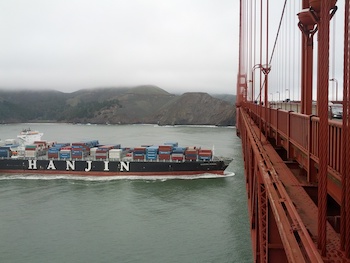
If Emily St John Mandel’s novel The Glass Hotel is not my favourite book of 2020 I will be surprised. I’ll also be delighted, because books this good are not as common as I’d like. Mandel’s previous novel, Station Eleven, is a wonderful story about the survivors of a flu pandemic. This latest one was described in a Guardian review as being about “the global financial crisis as a ghost story“. I couldn’t resist the idea of such a book that included finance, shipping and luxury hotels.
The book tells the story of a number of characters whose lives are entangled. The sweep of lives and time reminded me a little of A Visit from the Goon Squad. The writing is fantastic, building empathy for the characters as well as including some great epigrams (“luxury is a weakness” or “there’s a difference between being intelligent and knowing what to do with your life”).
Much of the book follows a young woman called Vincent through a life of sudden luxury. She finds this a strange fantasyland, saying to one character “I was trying to figure out why my life felt more or less the same in Singapore as it did in London, and that’s when I realized that money is its own country“.
Vincent is fully aware of how her life has changed, from working in a bar to being rich. “What kept her in the kingdom was the previously unimaginable condition of not having to think about money, because that’s what money gives you: the freedom to stop thinking about money. If you’ve never been without, then you won’t understand the profundity of this, how absolutely this changes your life“
Throughout the book there is a sense of growing doom. Early in the book, one character asks another “Do you find yourself sort of secretly hoping that civilization collapses just so that something will happen?” One character and his partner are financially ruined, and he grapples with “an unspoken understanding: neither of them would leave this continent again”.
None of which captures how strange this book is. The incursions of weirdness in the the characters’ lives is subtle, and the real elements feel almost as haunting; like that feeling you get walking through quiet hotels: “he didn’t feel alone in all this space, all of these empty corridors and rooms. It was as though the hotel were haunted, but in the most benign sense: the rooms still held an air of presence, a sense of occupation, as if at any moment the boat might pull in with new guests and Raphael might walk out of his office complaining about the latest staffing problem.”
This haunting also comes through in the discussions of shipping and the infrastructure that holds the world together; magically keeping the shelves stocked, notably only when it fails. “there are tens of thousands of ships at sea at any given moment and he liked to imagine each one as a point of light, converging into rivers of electric brilliance over the night oceans, flowing through the narrow channels of the Suez and Panama Canals, the Strait of Gibraltar, around the edges of continents and out into the oceans, an unceasing movement that drove countries, a secret world that he loved so much”.
The Glass Hotel contains links to Station Eleven, one being that the same flu virus is present in both books, but the outbreak is only mentioned briefly as being under control in the Glass Hotel. And while The Glass Hotel has little overt connection to the current moment, it felt like the perfect book for thr current time. As Mandel said in an interview at the University of Florida, “You can make an argument that the world’s become more bleak, but I feel like we always think we’re living at the end of the world. When have we ever felt like it wasn’t going to be catastrophic?”